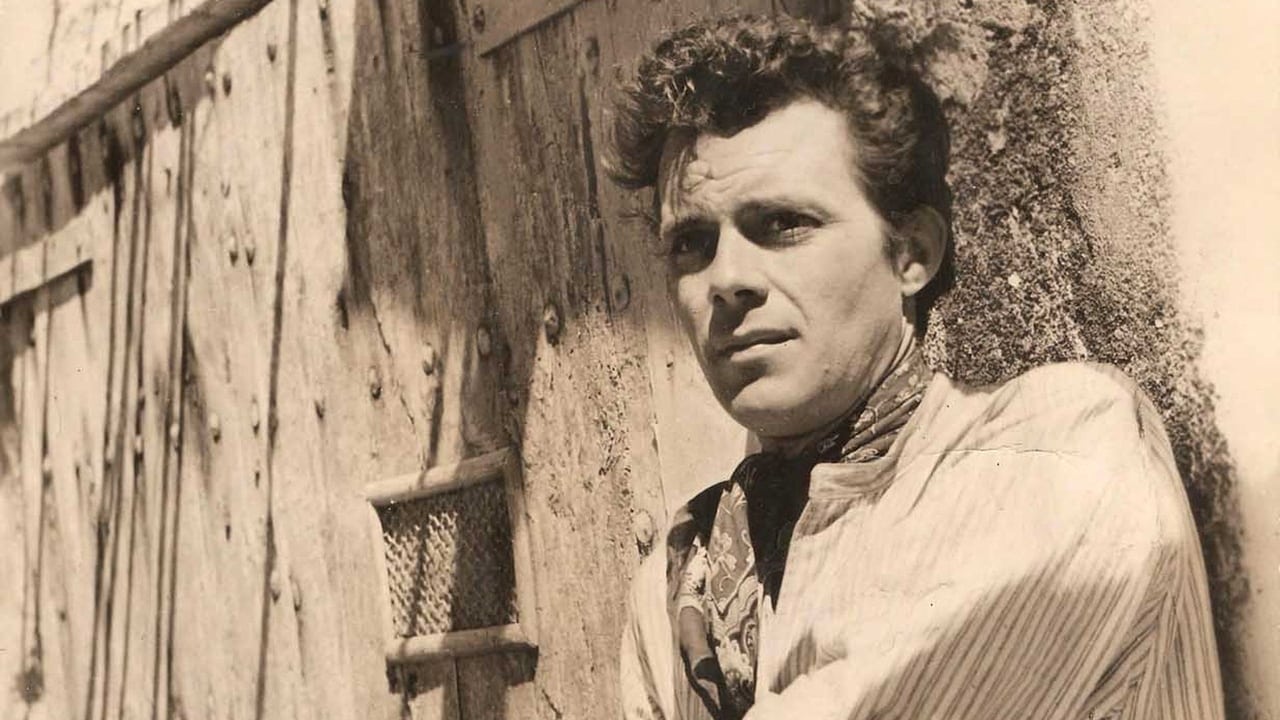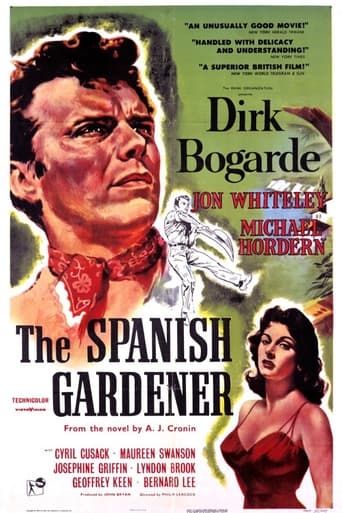

The very first frame brilliantly sets the mood and theme. As the movie opens, young Nicholas is isolated on the frame's left side leaving the remainder to a void, specifically, the gloomy interior of a British Embassy. He is peering out a window at a busy street below. Soon we hear raised voices from the next room. Then, two men enter, and the story swings into action. But this first glimpse shows us what we need to know—a lonely, curious boy separated from the world by elegantly impersonal surroundings and apart from adults in his life. In effect, the movie's 90-minute remainder shows us the boy's difficult journey from that detached space above to the worldly space below.Naturally, a human interest story like this depends heavily on the quality of the performances. Fortunately, they're almost uniformly outstanding, particularly Hordern's. As the emotionally bottled-up father he's simply superb. He's very good at concealing unwanted emotions before they betray inner conflict and possible weakness. And being a diplomat in British employ, the self-discipline goes logically with the job. The trouble for Brande (Hordern) is that he has allowed that professional demeanor to take over his private life, as well, resulting in an emotional prig who's already lost his wife and is in the process of losing his son. The latter are quietly wrenching scenes, especially when the Spanish gardener Jose (Bogarde) arrives and the boy's conflicts become painfully evident. It's significant that the boy's mentoring companion is made a gardener—that is, a man who knows how to make young things grow. (Note too how quickly the screenplay connects the handsome Jose with a girlfriend, thereby forestalling possible innuendo.) Ironically, then, it's the understanding menial and not the father, who provides Nicholas with the needed opportunity to grow. Thus, when Nicholas doffs his white shirt to join in the gardening and the sun, it's a highly symbolic act, and I was reminded of those imperial times when the conquering British were disparagingly said "to go native" by adopting customs from the locals. As a result, the rivalry between the cultured diplomat and the athletic gardener can be taken in that broader sense as involving more than matters of personal jealousy. Thus Dad's first admonition to Nicholas is to put the shirt back on, and all that signifies.To me, the movie's first two-thirds come across as a triumph in the art of stylistic naturalism—the riveting seaside vistas, the subdued performances (excepting Cusack's overdone Garcia), along with the sensitive dialogue— for example, note the subtle lengths Robert Buford and others go to so as not to offend the insecure Brande. However—in passing —I do think the accusatory line about failing as a man is unnecessary and contrary to the film's strength, a strength that lies in "showing" rather than in "telling". In short, we've already been shown Brande's key character failing, no need to tell us.Unfortunately, the movie's final third turns baldly melodramatic and contrived. The stagey storm and chance meetings at the mill may provide some dramatic action, but they also undercut the modulated naturalism that's so effectively defined the movie. I don't know how much of the melodrama was in the Cronin novel, but the sudden departure prevents the movie from being the classic it should have been, at least in my little book.Nonetheless, it's an unforgettable film in so many ways. Of course, the slow pace is not everyone's cup of tea-- which may be why the last part was turned into melodrama. Still and all, there's so much that's impressive, from Whiteley's affecting performance to Bogarde's smiling approach from the bosom of the seaside. I guess the story could be taken as an allegorical comment on what happens to even the coldest-climate British when introduced to the soothing rays of the Spanish Riviera. However that may be, it remains a moving film of memorable moments and one of my favorites.
... View MoreDirk Bogarde is "The Spanish Gardener" in this 1956 film also starring Michael Hordern, Cyril Cusack and Jon Whiteley. Hordern is Harrington Brande, a low-level diplomat sent, against his wishes, to Catalunya. His marriage is over, and his young son Nicholas (Whiteley) is everything to him - so much so, that he cannot see that his son needs to be with children his own age and participate in the same types of activities that other children do.He hires a gardener, Jose (Bogarde) who befriends the boy and becomes almost a surrogate father to him, letting him help with the planting and digging, talking with him and playing with him. When Nicholas' father finds out how close the gardener and his son have become, he forbids the boy to speak to him any longer. When that doesn't work, he takes further steps to make sure that Jose doesn't steal the love of his son."The Spanish Gardener" is a wonderful character study of a gentle soul with a kind heart, the gardener, coming up against a class-conscious, jealous, embittered man who thinks the best way to keep his son's affection is to make sure he never socializes with anyone else who may pose a threat. He doesn't realize that the worse he treats Jose, the more his son hates him, and that love sometimes means letting go.The acting is superb. Hordern is fabulous as a person whose career hasn't progressed because he hasn't progressed as a person, and Whiteley is sympathetic and earnest as the young boy, whom the gardener calls Nico. Bogarde is at the peak of his handsomeness in this film, and gives a beautiful performance, playing a man of humility but not submission.Interestingly, I doubt a film like this could be made today. I'm sure in the '50s, the friendship between the gardener and Nico was taken for what it was without suspicion of sexual misconduct, which would certainly be an element now and add another dimension. Simpler times.Definitely worth seeing.
... View MoreDIRK BOGARDE gives one of his more restrained performances in the title role, a man whose friendship with a young boy (JON WHITELEY) drives a wedge between the boy and his over-protective father (MICHAEL HORDERN). It's the interplay between these three characters that drives the story and there are some melodramatic events before the happy ending.But it takes its time in developing the characterizations, sags in the middle and then picks up again during the last half-hour when all the melodramatic conflicts have to be resolved.Unfortunately, the TCM print shows murky color photography (especially after showing a dazzling print of BLACK NARCISSUS). Whether the film was shot in a process other than the usual British color I don't know, but the color photography was sometimes less than satisfying.The story is one of friendship that the boy so badly needs when his father has too little time to share many activities with him. The bond between him and the Spanish gardener is based on mutual trust and the boy comes to hate his father when he realizes that he's been the cause of the man being jailed for a crime he didn't commit.JON WHITELEY gives a remarkably natural performance for a child actor and his scenes with DIRK BOGARDE and MICHAEL HORDERN are excellently played.There are problems of pacing that plague some parts of the film, but the last half is particularly absorbing and leads to a satisfying conclusion. Well worth watching.
... View MoreA minor English diplomat is posted to Catalunya in the aftermath of his collapsed marriage. He takes his young boy with him, with visions of nurturing the father-son bond. Unfortunately, Brande is a 'stuffed shirt', a cold prig of a man who fails to comprehend his son's needs. He orders the gardens of the residence to be reduced to bland English regularity, instead of leaving them as a wild, overgrown delight for a child's imagination. Jose is jobless and penniless, but the local pelota champion is a prince among men - young, handsome, charismatic and kind. When Jose is taken on as the gardener, he begins to supplant Brande in Nico's affections. A decision was obviously taken, pre-production, to dispense with Spanish accents. There is some sense in this, because it can seriously detract from the film's purpose if the actors are constantly struggling to sustain funny voices, but it does produce an odd result. Dirk Bogarde is 'darkened up' for the part of Jose and looks great, but his smooth middle-class English delivery seems incongruous in the mouth of a Catalan labourer. When Nico visits Jose's home, every generation of the extended family speaks flawless English. That would be amazing in the year 2000: how likely was it in 1956? Brande (played beautifully by Michael Hordern as a spiritual cripple) embarks on a campaign of emotional blackmail towards Nico and a policy of bullying Jose. He is incapable of seeing that this approach is doomed to failure, or that the subtly obsequious Garcia (Cyril Cusack) is the Iago to his own Othello. The ungracious refusal of Jose's fish marks the first breach of trust between father and son, but character is fate, and Brande is set on a course from which he cannot extricate himself. The confrontation between Brande and Nico on the staircase is one of the best things in the film. Young Jon Whiteley, in the part of Nico, gives an outstanding performance. Bogarde plays the accusation scene with spot-on coolness, but would the theft of a watch, even at Franco's apogee, even if it involved a foreign diplomat, merit custody, handcuffs and an armed Civil Guard escort? Would someone accused of such a minor offence really prefer to take to the hills as a brigand? Brande's Lear-like volte face in the rain-sodden mill is an affecting scene, and though the whole thing is rather far-fetched, it works as an entertaining fable.
... View More